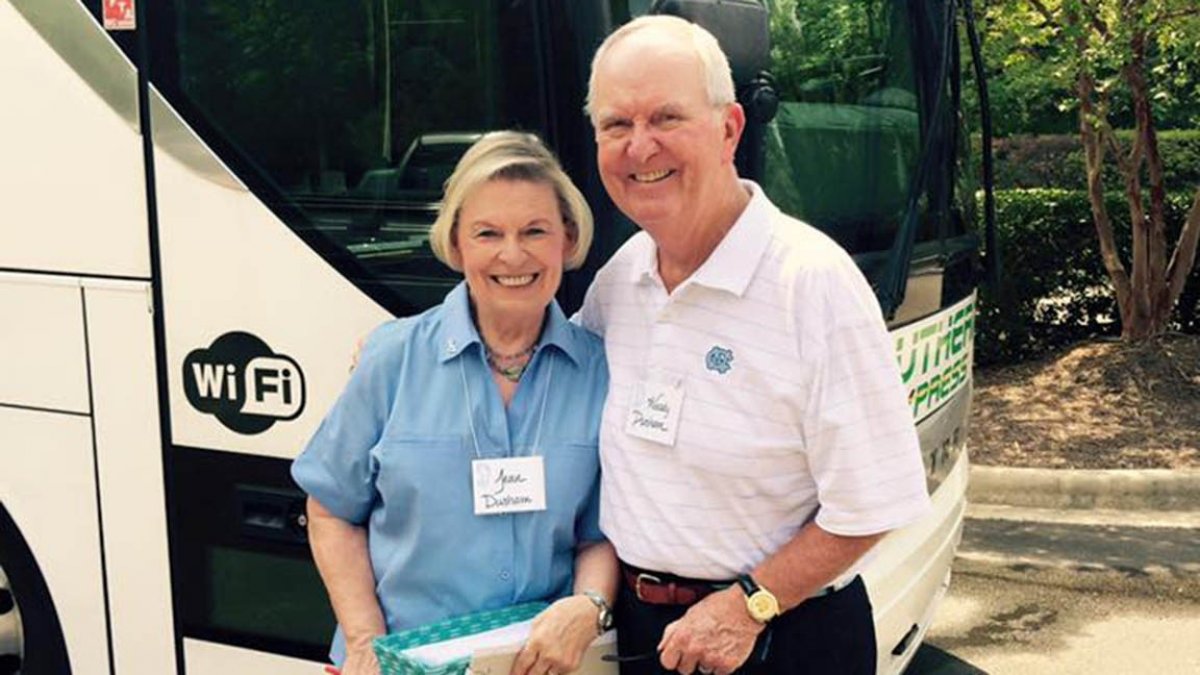What Woody says
Woody Durham has primary progressive aphasia, and he felt an obligation to tell Tar Heel fans why they would no longer see him making speeches or hosting events or telling stories in public.

Click here for a letter from Woody Durham.
Woody Durham would know what to say.
That’s my overriding thought as I sit here staring at this blank screen, trying to figure out exactly what to write about a topic I don’t want to acknowledge.
Woody, of course, always knows what to say. He’s taken us through the highs and lows of Carolina sports for the past 40 years. He told us it was “Un-beee-leeeee-va-ble!” when Walter Davis hit the shot in 1974, he celebrated with us as the Tar Heels won national championships, and he consoled us on even the bad days.
Before the ubiquitous presence of ESPN, Woody was our link to Carolina sports. I vividly remember setting my alarm for the middle of the night so I could listen to Woody broadcast a Tar Heel basketball game from Alaska in the mid-1980s. I listened to the whole thing in my room. When my family woke up the next morning, the first thing my dad asked me was, “What did Woody say?” Not “What was the score?” or “Who won?” or “Who played well?”
What did Woody say?
Woody said everything that mattered to us for four decades, which is why it’s difficult to sit in his living room on this spring afternoon. It’s a familiar place — this is where we sat to work on his book, A Tar Heel Voice. It wasn’t exactly a difficult assignment. I’d send Woody and his wife, Jean, a couple of ideas in the days before we met each week. Then I’d show up, turn on the tape recorder, and listen to Woody tell stories.
That’s always when he’s been at his best. Did you ever see him at a Rams Club meeting, or at the basketball banquet, or even in the bread aisle at the grocery store if you happened to be a Chapel Hill resident? Woody always told you just enough to make you feel like you’d taken a sneak peek at Tar Heel athletics, but never quite enough to tell you everything he really knew.
Today’s meeting isn’t as fun as the ones we had while writing his book. Today’s meeting is because Woody Durham has primary progressive aphasia, and he felt an obligation to tell Tar Heel fans why they would no longer see him making speeches or hosting events or telling stories in public. He wants you to know a little more about this condition, and he wants to generate some fundraising and support for it.
It’s a complicated disorder, as you would expect from something that affects the left frontal lobe of the brain, the area that controls communication. It’s not a memory disorder, although sometimes it can seem that way. Woody knows the words he wants to say, can recall the stories he wants to tell, but can’t quite get his brain to send the exact words to that golden tongue.
The encyclopedic knowledge of the Tar Heels is still in there. In the course of only a half-hour, he tells stories about Brendan Haywood, Ethan Albright and Danny Green. But they come more haltingly, and sometimes with a little interjection from Jean to guide it in the right direction.
His friends, along with his sons Taylor and Wes, would tell you that the most noticeable difference between this Woody and Woody in his prime are the occasional stretches of silence. Woody Durham commanded every room he ever entered. Now, Jean often takes the lead. He has developed a deeper interest in old movies. He and Jean recently watched and enjoyed an HBO series on Lyndon Johnson. These are the things you don’t have time to do when you are spending a career as the Voice of the Tar Heels.
They make trips to Atlanta to see Wes. Woody prefers to drive rather than fly these days, the hassle of airports being something he prefers to leave in his former well-traveled life with the Tar Heels.
Woody still has plenty to say. He sips from a coffee mug that says—of course it does — “True Blue.”
“Tell them the story about Will coaching basketball,” he tells Jean. This is a good story, a fun story. Let Jean tell it. The couple has already beamed as they’ve described their other grandchild, Will’s twin sister Emily, making college visits to some very prestigious campuses. Now it’s time to talk about their other pride and joy.
So Jean launches into a narrative of the couple’s grandson, Will, coaching a youth basketball team. Woody adds that Will even received a technical foul in one game. Jean fills in the details, the phone calls from Will to his grandparents, the wins and the losses.
Woody sits across from his wife and grins broadly. This, right now, is one of his very favorite stories.




